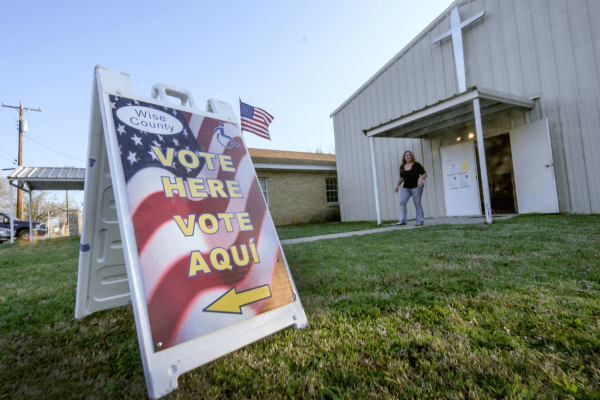Elections typically revolve around the “what” of politics: the competing ideologies, policy differences, and visions for the future. But lately, our politics has increasingly become dominated by the “who” of politics, including the personalities of our candidates. I fear that for many, politics has become another form of entertainment.
But the “how” of politics — engaging in ways that uplift civility, truthfulness, empathy, and integrity — still matters, particularly in a time in which our democratic norms and systems are being challenged. From a Christian standpoint, how we engage in politics should be rooted in the fruit of spirit, which in his letter to the Galatian church, the Apostle Paul describes as “love, joy, peace, forbearance, kindness, goodness, faithfulness, gentleness, and self-control” (Galatians 5:22-23). Obviously, these virtues are not the norm in our body politic. And while it’s easy to blame politicians, we must first remove the speck from our own eyes.
In The Scandal of the Evangelical Conscience, published in 2005, Ron Sider argued that in “their daily activity, most ‘Christians’ regularly commit treason. With their mouths they claim that Jesus is Lord, but with their actions they demonstrate allegiance to money, sex, and self-fulfillment.” I think that same scandal also applies to how we Christians often engage in politics: Instead of being salt and light, as Jesus called his followers to be in the Sermon on the Mount (Matthew 5:13), we often copy many of the same behaviors that are polarizing our politics, including embracing an “us versus them” mentality and assuming our political ends justify our means.
Last year, Sojourners convened a diverse group of Christian leaders to reflect together on the growing crisis of polarization and the danger of anti-democratic forces within our politics.
The group committed to work together to identify ways we could model and inspire a healthier version of Christian civic engagement. We lamented that many congregations and denominations have become increasingly segregated along ideological and cultural lines and that many people are finding meaning, belonging, and community in partisan politics rather than in a faith community. We talked about how too many churches in the U.S. find themselves at one of two extremes: apolitical or hyper-partisan. Churches either avoid all discussion or engagement with politics in an effort to be apolitical or become overly politicized and faith takes a backseat to political identity.
And we shared our alarm about how Christian nationalism — a distortion of Christianity and patriotism — threatens both the witness of the church and the future of the U.S. as a more inclusive and just multiracial democracy. But as we discussed the importance of countering the toxic influence of Christian nationalism on the Religious Right, several leaders warned against a similar tendency among religious folks on the Left who risk appearing as chaplains to Democrats. The bottom line is that when organizations or individuals allow their political allegiance and identity to shape and supersede their faith rather than the other way around, they open themselves up to idolatry, regardless of whether those political allegiances lean to the Left or the Right.
The group eventually drafted a statement that communicates a third, more faithful way that we believe Christians are called to engage in politics and civic life, which we call “civic discipleship.” We affirmed our belief that “voting and civic engagement are important parts of discipleship and serve as acts of stewardship, rooted in our shared commitment to honoring the image of God in each human being.” We then explain what we believe civic discipleship entails, including resisting us versus-them thinking, confronting violence with nonviolence, seeking truth, exercising prudence, embracing a long-term view, and being political but never partisan.
What would it look like for Christians of all stripes to truly serve as salt and light in our politics and civic life? First, let us remember that salt is both a preservative and a seasoning, essential for how our body functions, from nutrient absorption to muscle function. Light illuminates and generates warmth. When we are acting as salt, we may find ourselves exercising prudence and long-term thinking, preserving the checks and balances of our democracy that have served us well — and should not be cast aside in the name of political expedience or the illiberal pursuit of power.
For example, we might find ourselves acting with moral consistency to oppose partisan gerrymandering, including efforts that make it more difficult for our political opponents to vote. We can also maintain our commitment to nonviolence, denouncing and resisting all forms of political violence.
Being light in our politics might compel us to seek truth by pushing for meaningful campaign finance reform that makes it more difficult for powerful special interests to distort our democracy with dark money. Being light means ensuring that every voter is able to vote and every vote is counted, because efforts to suppress or intimidate voters undermine our democracy and assault the image of God in every voter.
While it’s easy to feel resigned or exasperated about the state of polarization in our politics and the church, the good news is that there’s a growing movement working to transform how Christians engage in voting and our civic life. These efforts include The After Party, Matthew 5:9 Fellowship, Following the God Who Transforms, Faith Over Division, Faiths United to Save Democracy, Faithful Citizenship, 20 Minute Takes, and many more groups and resources.
“Throughout history, Christians have been seduced by the pursuit of power and have often allowed our faith to be coopted,” warns our statement. We point out that Jesus “lived in a time of extreme polarization,” yet continually “rejected the hypocrisy of religious leaders and reframed faithfulness as a commitment to steadfast love to both our neighbors and our enemies.”
Instead of seeking the power of this world, we are called to “seek yet first the kingdom of God.” A growing movement of Christians who live out these principles will both transform our politics and rehabilitate many of the negative perceptions of Christianity that are causing so many to leave and become disaffected with the church. Instead of the misuse and abuse of our faith for extreme ideological or partisan purposes, our faith could become a balm that helps to depolarize our communities and a catalyst that builds the beloved community.
Got something to say about what you're reading? We value your feedback!







